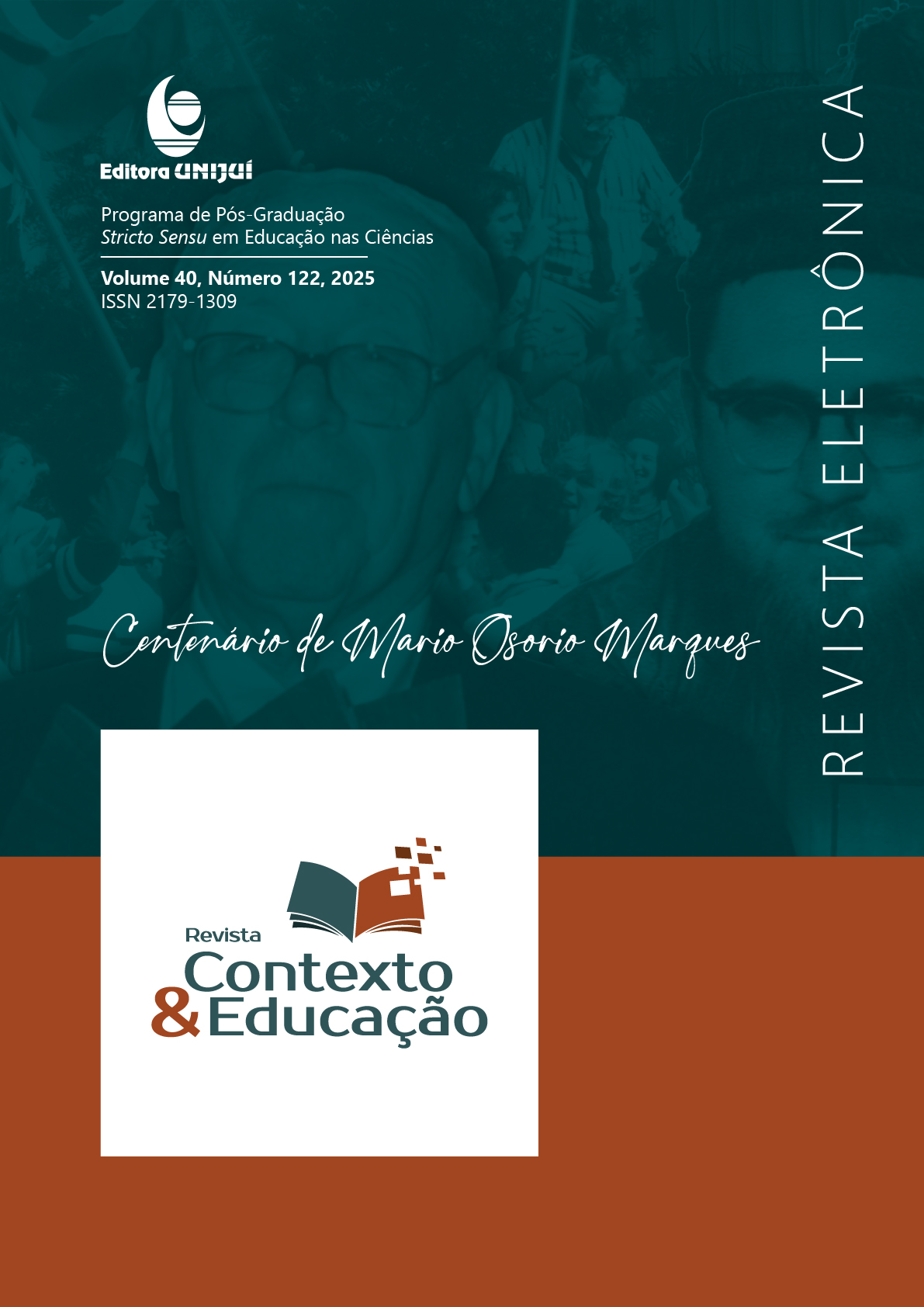Paradigms of knowledge and neomodernity: The relevance of Mario Osorio Marques' proposal
DOI:
https://doi.org/10.21527/2179-1309.2025.122.16949Keywords:
Paradigms, neomodernity, knowledge, schoolAbstract
The legacy of Mário Osório Marques leaves us, among many other valuable contributions, the notion of paradigms of knowledge and reason – ontological, modern subjective and intersubjective – in the human tradition. This paper traces a path of bibliographical review and hermeneutical source that disagrees on each paradigm proposed by the author, as well as a transition between them. Marques enables the tension between each paradigmatic moment and the presence, limitations and possibilities of education in the conception of truth, positioning himself, after a linguistic turn, in the paradigm of communicative reason, which enables the conception of neomodernity, a term coined by Rouanet. Thus, neomodernity is proposed as a paradigmatic position capable of thinking about the problem of knowledge, education/learning and the implications of this for the social dimension of the world. The neomodern paradigmatic positioning and intersubjective reasoning represent the possibility of escaping the civilizing and emancipatory potential of the Enlightenment, in the face of a context of relativism, fake news and authoritarianism, that is, what Marques called a context of “systematically disturbed, asymmetrical and manipulative communication”.
References
ADORNO, Theodor W.; HORKHEIMER, Max. Dialética do esclarecimento: fragmentos filosóficos. 2. ed. Rio de Janeiro: Jorge Zahar Editor, 1986.
ARENDT, Hannah. Entre o passado e o futuro. Tradução de Mauro W. Barbosa. São Paulo: Perspectiva, 2016.
ARENDT, Hannah. Origens do totalitarismo. Tradução de Roberto Raposo. São Paulo: Companhia das Letras, 2012.
BOUFLEUER, José Pedro. Paradigmas do conhecimento e da educação. [S.l.: S.d.].
BRAYNER, Flávio Henrique Albert. Educação e republicanismo: experimentos arendtianos para uma educação melhor. Brasília: Liber Livro Editora, 2008.
CHARLOT, Bernard. Educação ou barbárie? Uma escolha para a sociedade contemporânea. Tradução de Sandra Pina. São Paulo: Cortez, 2020.
CONDORCET, Jean-Antoine-Nicolas de Caritat, marquis de. Cinco memórias sobre a instrução pública. São Paulo: Unesp, 2008.
DESCARTES, René. O discurso do método. Tradução de Paulo Neves. Porto Alegre: L&PM, 2016.
DUFOUR, Dany-Robert. A arte de reduzir as cabeças: Sobre a nova servidão na sociedade ultraliberal. Trad. Sandra Regina Felgueiras. Rio de Janeiro: Companhia de Freud, 2005.
ENGELS, Friedrich; MARX, Karl. Manifesto do partido comunista. Tradução de Sueli Tomazini Barros Cassal. Porto Alegre: L&PM, 2010.
HABERMAS, Jürgen. Teoria do agir comunicativo: racionalidade da ação e racionalização do social. Tradução de Paulo Astor Soethe. São Paulo: Editora WMF Martins Fontes, 2012.
KAKUTANI, Michiko. A morte da verdade: notas sobre a mentira na era Trump. Tradução de André Czarnobai e Marcela Duarte. Rio de Janeiro: Intrínseca, 2018.
MARQUES, Mario Osorio. Educação nas ciências: interlocução e complementaridade. Ijuí: Editora UNIJUÍ, 2002.
MARQUES, Mario Osorio. Educação / interlocução, aprendizagem / reconstrução de saberes. Ijuí: Editora UNIJUÍ, 1996.
MARQUES, Mario Osorio. Conhecimento e modernidade em reconstrução. Ijuí: Editora Unijuí, 1993.
MARQUES, Mario Osorio. Os paradigmas da educação. Revista Brasileira de Estudos Pedagógicos. v. 73. n. 175. p. 547-565. set/dez; Brasília, 1992.
MASSCHELEIN, Jan; SIMONS, Marteen. A pedagogia, a democracia, a escola. Belo Horizonte: Autêntica Editora, 2014.
POLANYI, Karl. A grande transformação: as origens políticas e econômicas de nossa época. Tradução de Vera Ribeiro. Rio de Janeiro: Contraponto, 2021.
SANTAELLA, Lucia. A pós-verdade é verdadeira ou falsa?. Barueri: Estação das Letras e Cores, 2019.
SAVATER, Fernando. O valor de educar. São Paulo: Martins Fontes, 2000.
SILVA, Sidinei Pithan da; FENSTERSEIFER, Paulo Evaldo. Aprendizagem e racionalidade no projeto da neomodernidade. Cadernos de Educação, n. 45, p. 82-88, 11, 2013. DOI: 10.15210/caduc.v0i45.3824. Disponível em: https://periodicos.ufpel.edu.br/index.php/caduc/article/view/3824. Acesso em: 15 jan. 2025.
SILVA, Tomaz Tadeu da. Sociologia da educação e pedagogia crítica em tempos pós-modernos. In: SILVA, Tomaz Tadeu da (Org.). Teoria educacional crítica em tempos pós-modernos. Porto Alegre: Artes Médicas, 1993. P. 122-140.
SOLER, Colette. O que faz laço? Tradução Elisabeth Saporiti. São Paulo: Escuta, 2016.
TODOROV, Tzvetan. O espírito das luzes. Tradução de Mônica Cristina Corrêa. São Paulo: Editora Barcarolla, 2008.
Downloads
Published
How to Cite
Issue
Section
License
Copyright (c) 2025 Revista Contexto & Educação

This work is licensed under a Creative Commons Attribution 4.0 International License.
By publishing in Revista Contexto & Educação, authors agree to the following terms:
All works are published under the Creative Commons Attribution 4.0 International License (CC BY 4.0), which allows:
Sharing — to copy and redistribute the material in any medium or format;
Adaptation — to remix, transform, and build upon the material for any purpose, even commercially.
These permissions are irrevocable, provided that the following terms are respected:
Attribution — authors must be properly credited, a link to the license must be provided, and any changes made must be indicated.
No additional restrictions — no legal or technological measures may be applied that legally restrict others from doing anything the license permits.
Notices:
The license does not apply to elements that are in the public domain or covered by legal exceptions.
The license does not grant all necessary rights for specific uses (e.g., image rights, privacy, or moral rights).
The journal is not responsible for the opinions expressed in the articles, which are the sole responsibility of the authors. The Editor, with the support of the Editorial Board, reserves the right to suggest or request modifications when necessary.
Only original scientific articles presenting research results of interest that have not been previously published or simultaneously submitted to another journal with the same purpose will be accepted.
Mentions of trademarks or specific products are intended solely for identification purposes and do not imply any promotional relationship by the authors or the journal.
License Agreement (for articles published from October 2025): Authors retain the copyright to their article and grant Revista Contexto & Educação the right of first publication.


